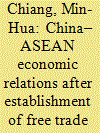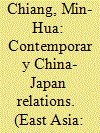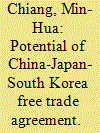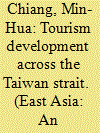|
|
|
Sort Order |
|
|
|
Items / Page
|
|
|
|
|
|
|
| Srl | Item |
| 1 |
ID:
165865


|
|
|
|
|
| Summary/Abstract |
This paper aims to contribute to an understanding about the major changes in China–ASEAN economic relations after establishment of the China–ASEAN Free Trade Area (CAFTA) in 2010. First, China's merchandize trade balance with ASEAN has shifted from deficit to surplus since 2012. This reflects China's improving comparative advantage in manufacturing production vis-à-vis ASEAN as a whole. Second, with China's wage hike, ASEAN investors can no longer take advantage of China's cheap labor force. Concurrently, China's investment in ASEAN has been increasing and become more diversified, ranging from energy to manufacturing and services. Singapore has remained the most important investment destination for Chinese investors and the largest foreign investor in China among ASEAN countries. Third, China has comparative advantages in providing construction, telecommunications, computer and information services and other business services to ASEAN. On the other hand, ASEAN, led by Singapore, has opportunities in the financial services and tourism markets in China. Finally, the development of economic regionalism, notably the Regional Comprehensive Economic Partnership and Trans-Pacific Partnership, will remain critical for the CAFTA's relevance in regional economic integration, as well as China–ASEAN relations in the future.
|
|
|
|
|
|
|
|
|
|
|
|
|
|
|
|
| 2 |
ID:
171148


|
|
|
|
|
| Summary/Abstract |
This article presents the importance of political factors in the development of China-Japan economic relations over the last four decades. The China-US reconciliation and the rise of the pro-China Japanese Prime Minister Tanaka Kakuei (1972–1974) led to the normalization of China-Japan relations in 1972. The bilateral political rapport was further consolidated in the face of the common threat in the Soviet Union. With the strengthening political relations, the bilateral economic exchanges were gradually developed. Nonetheless, following the collapse of the Soviet Union, mounting Sino-US tension, China’s growing assertiveness, and rising nationalism in both China and Japan, the Sino-Japanese bilateral political relations have been deteriorating. The escalating political tensions have impacted bilateral economic relations, including declining Japanese investment in China, weakening bilateral trade, and decreasing Japanese visitors to China. Despite improving bilateral political relations in recent years, it is uncertain how long these friendly gestures by the leaders of the two countries may last given several unsettled territorial and historical issues. The growing tension between the United States and China further adds uncertainty to China-Japan relations in the future. Without strong political relations, weakening economic ties cannot be easily restored.
|
|
|
|
|
|
|
|
|
|
|
|
|
|
|
|
| 3 |
ID:
124180


|
|
|
|
|
| Publication |
2013.
|
| Summary/Abstract |
This article explores the economic calculations behind the recent initiatives for the Free Trade Agreement (FTA) between the Governments of China, Japan and South Korea (CJK) and clarifies the implications for future regional economic integration. First, the proposed trilateral FTA signifies an advancement of China-centered regional economic integration. Regional economic integration led by China may also increase its political clout at the global stage. Second, the Governments of South Korea and Japan seek greater involvement in China's huge domestic market, but the former is concerned that a trilateral FTA will worsen its trade deficit with Japan, and the latter is afraid of losing its market shares in China and America to its Korean rival. Japan, therefore, seeks membership of both the CJK FTA and the Trans-Pacific Partnership (TPP). Third, China and the US' active involvement in regional economic integration will push the three countries to go forward towards greater economic cooperation. However, it will take longer for China-led Regional Comprehensive Economic Partnership (RCEP) and America-led TPP to bear fruit because of the large number of countries involved. Therefore, the conclusion of CJK FTA will be an important boost for the further progress of both RCEP and TPP. It will also be an important stabiliser for the trilateral political relations in the future.
|
|
|
|
|
|
|
|
|
|
|
|
|
|
|
|
| 4 |
ID:
117035


|
|
|
|
|
| Publication |
2012.
|
| Summary/Abstract |
This article examines the tourism development between Taiwan and China over the last three decades under different political situation. First, Taiwan's democratization in the 1980s made the control over outbound travel to China no longer necessary. Meanwhile, the Taiwanese visitors were welcomed at the time when China's foreign currency was in deficiency. Second, the opening up of mainland Chinese visitors to Taiwan since 2008 marked another breakthrough in the Cross-Strait tourism development. However, as the opening up of Chinese tourists to Taiwan is based on the same "political consensus" between the Communist Party of China (CPC) and KMT in Taiwan, any dissimilar political agreements in the future may lead China to constrain the number Chinese tourists to the island. Third, the rapidly growing number of Chinese tourists brought much business benefit to the various tourism sectors in Taiwan. Nonetheless, the contribution to Taiwan's economy is in doubt due to the insignificant tourism sector in Taiwan's overall economy. From the current perspective, the tourism development across the Strait is more politically symbolic than substantive.
|
|
|
|
|
|
|
|
|
|
|
|
|
|
|
|
|
|
|
|
|